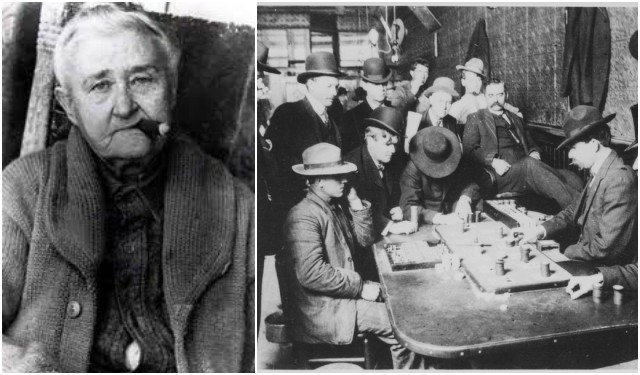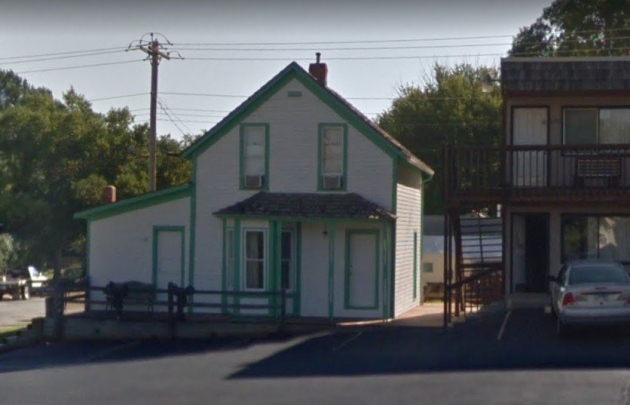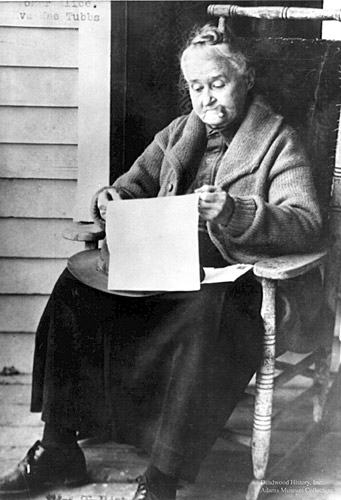A lot has been written about Poker Alice whose death in 1930 long preceded her fame. Like many myths of the West, those of Poker Alice have grown in time. When she died she was a somewhat infamous speakeasy and brothel owner with a colorful past -- not exactly a leading citizen of Sturgis.
Consider how her life must have appeared to the world in 1930:
- She owned a brothel
- She was a bootlegger.
- She had killed a man
- She was a professional gambler
- She was a convicted felon
- She smoked cigars
- She had been married three times
- And, she carried a gun
...not someone who was welcomed into polite company
Now, more
than 90 years after her death, we can see that she was an
Old West
character every bit as colorful as such legendary Deadwood
figures as
Wild Bill Hickok and Calamity Jane, who she probably knew.
But unlike
those earlier Western figures, the details of Poker
Alice's life are well documented, although often
erroneously.
Take, for instance, the detail of her birth. Almost every reference gives her date and place of birth as February 17, 1851 or 1853 in Devonshire, England, because this is what she claimed. In fact, sources suggest she was born in Virginia in 1853 to Irish immigrants. Here's the rest of the story:
Although she is most famous as a madam, she did not become a brothel operator until 1910, when she would have been about 60 years old. Prior to that, she made a good living for most of her life as a faro dealer and poker player. After 1919, her main line of business was as a speakeasy operator during prohibition. The "girls" were more or less a sideline.
Alice, whose maiden name was Alice Ivers, may have been taken to Colorado by her parents. There she met and married Frank Duffield, sometime in the 1870s. Duffield was a mining engineer who was killed shortly after their marriage. He was resetting an unexploded dynamite charge in a mine at Leadville, Co. Duffield, a skilled poker player, had taught Alice how to play poker and she found that she had a good head for counting cards and figuring odds. Alice was also good at using her looks to distract male players. Most pictures of Alice show a gruff woman in her 70s smoking a cigar. In fact, even into her 50s, Alice was considered attractive and wore only the finest clothes.
Alice often told a story about breaking the bank at a faro table in Colorado then using the cash to go to New York City. She did live in New York briefly in the 1870s or 1880s and undoubtedly, it was her faro winnings that bankrolled the trip. But, most likely, she just saved up enough cash to go. However, Alice, never one to miss an opportunity to embellish a story, liked to say she broke the bank.
Throughout
the
1880s, Alice worked in saloons across the West as a faro
and poker
dealer. Her skill and beauty resulted in very good pay.
She certainly
had plenty of money to buy the finest clothes with fancy
low-cut
gowns, ostrich plumes and other fancies of the day. It is
likely that
she worked the gambling halls in the Colorado towns of
Alamosa,
Georgetown, Trinidad, Central City and Leadville, as well
as those in
Silver City, New Mexico, before moving to Deadwood.
The exact date of Alice's arrival in Deadwood is not known, but it was probably around 1890. In Deadwood she met Warren G. Tubbs, a house painter from Sturgis and a fellow card dealer. Their romance is said to have bloomed after Alice shot a man in the arm who had been threatening Tubbs with a knife. She and Tubbs married and had seven children. During this time Alice was reputed to have been able to make as much as $6,000 gambling on a good night -- a huge amount of money back then.
Alice would say that Tubbs wasn't a very good card player, or, in her words: "he wasn't lucky." Perhaps. But few people could play as well as Alice.
While her children were growing up, Alice tried to keep them away from the gambling houses and at one point she and Tubbs decided to homestead a ranch northeast of Sturgis on the Moreau River. Tubbs had contracted tuberculosis and Alice hoped to nurse him back to health. By some accounts, Alice's time at the Moreau Ranch were some of the happiest in her life. She would later recount how she liked the peace and quiet and never missed the saloons and gambling halls. Tubbs died in the winter of 1910 apparently from pneumonia. Alice used a horse-drawn wagon to take his body back to Sturgis for burial.
Times were undoubtedly difficult back then because she was no longer making a high income at the card tables. The story -- a legend perhaps -- is that Alice pawned her wedding ring to pay for Tubbs' funeral, then went into a saloon and won enough money at poker to get her ring back.
After Tubbs died, Alice hired George Huckert to take care of the homestead while she went back to Sturgis to earn some money. Huckert proposed to her several times until she famously said: "I owed him so much in back wages, I figured it would be cheaper to marry him than pay him off. So I did." His back wages were about $1,008. The marriage was short. Huckert died in 1913. Alice continued to call herself Alice Tubbs.
It was around 1910 that Alice bought an old house on Bear Butte Creek near the Fort Mead Army Post and opened the brothel. This resulted in, perhaps, the most repeated story about Poker Alice:
Apparently
the
house was small and needed extra rooms and "fresh girls"
to
perk up the business, so Alice went to a bank for a loan
of $2,000.
This is how the story is often reported, in words  supposedly spoken
by Alice:
supposedly spoken
by Alice:
"I went to the bank for a $2,000 loan to build on an addition and go to Kansas City to recruit some fresh girls. When I told the banker I'd repay the loan in two years, he scratched his head for a minute then let me have the money. In less than a year I was back in his office paying off the loan. He asked how I was able to come up with the money so fast. I took a couple chaws on the end of my cigar and told him, `Well it's this way. I knew the Grand Army of the Republic was having an encampment here in Sturgis. And I knew that the state Elks convention would be here too. But I plumb forgot about all those Methodist preachers coming to town for a conference'."
In 1913 there was an unfortunate incident at the bordello when a number of soldiers became unruly. Poker Alice fired a single rifle shot to quiet the troops, however the bullet ripped into two of them, killing one. When the police arrived, they took Alice and her six girls to jail, shutting down the brothel. Alice was later acquitted of any wrongdoing because the soldiers were in a near riot, and the shooting was ruled accidental. But forever after Ft. Meade authorities harrassed her.
Many times in the ensuing years she was arrested for drunkeness and keeping a disorderly house. She generally paid her fines and continued business as usual. Eventually, however, she was sentenced to a term in the state penitentiary for repeated convictions of operating a house of ill fame. Alice, who by this time was 75 years old, was pardoned by the governor.
Poker Alice's fame, or notoriety, followed her beyond her waning years. She died on February 27, 1930 in a Rapid City hospital after a gall bladder operation and is buried at St. Aloysius Cemetery in Sturgis. Her "house" stood vacant for many years and was scheduled for demolition until a Sturgis businessman bought it and had it moved to its present location on Junction Avenue in Sturgis.
Alice once claimed that she had won more than $250,000 gambling over the years and that she never once cheated. Both of these claims are probably true. Poker Alice didn't have to cheat. She knew how to count cards and she knew how to figure the odds. Plus, she was always skillful at "reading" other players while remaining stone-faced herself.
The story
of
Poker Alice needs to be taken in the context of her time.
In 1910,
when she returned to the workforce, she found the demand
for her only
skills in decline. The temperance movement and religious
zealots were
major forces in American politics. Alice's trade of more
than 30
years was fast becoming illegal as saloons, gambling halls
and the
like were closed down. In her many years as a professional
gambler,
she would have been well aware of the trade in the
upstairs rooms of
saloons. Alice, herself, was never a prostitute; as a
professional
gambler, she had much higher status. It may be safe to
assume that
she believed, in 1910, that the brothel was her only
economic option.
We may assume that Alice would have rather remained a
gambler.
Indeed, in her last decades she was a well-known card
player in
Deadwood, which, incidentally, tolerated gambling and
prostitution
until 1987. It would seem that in 1910, Alice was caught
up by the
changing mores. The businesses she had been around all her
life, and
which had been perfectly legal, were now under attack. One
could say,
she just did not change with the times.

Just for the heck of it, we've thrown in this version of
Poker Alice (Elizabeth Taylor) from a 1987 movie that had
absolutely nothing to do with the real Poker Alice.
----------------------
The information here was compiled from South Dakota Historical Society archives and the book "Poker Alice," by Mildred Fielder as well as other accounts. Accounts of Poker Alice differ. In this article we have generally used the versions of facts most often agreed upon by original sources. Discrepancies can sometimes be traced back to Poker Alice herself. For whatever reason, she sometimes gave different versions of the same stories.
---------------------